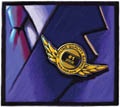
Top-Tier Talkers
Some people like to avoid arguments. Not so for members of the Cross Examination Debate Association, who live for exactly that. Some 500 collegiate debaters from 182 teams flooded the WSU campus in March to take part in the CEDA National Championship Tournament. Wichita State, whose debate team was ranked ninth in the nation in December 2007, last hosted the event in 1997. There was much to argue about this year, as the selected topic centered on the explosive subject of U.S. foreign policy in the Middle East. After the final arguments were made, Towson University of Maryland claimed the championship, with the University of Kansas coming in second. All of the top-tier talkers logged hours of work for the national competition. As Susan Huxman, director of WSU’s Elliott School of Communication, explains: “It's really amazing the amount of research, reasoning and presentation polish that goes into preparation for national debate competitions.”
Doctor of Divinity
Anthony Gythiel, WSU professor of history, has been awarded an honorary Doctor of Divinity degree by the trustees and faculty of St. Vladimir’s Orthodox Theological Seminary in Crestwood, N.Y. The St. George Orthodox Christian Cathedral was the site of the academic convocation for the presentation of the degree on May 21. Gythiel’s scholarly specialty is medieval and Renaissance Europe, and he has translated many books dealing with the theology of the early Christian East. His translation work has covered the historical theology of such world-renowned scholars as Bobrinskoy, Krivocheine, Lossky, Hausherr and Spidlik. Gythiel joined the faculty at Wichita State in 1971.
 Airline Quality Ratings’ No. 1
Airline Quality Ratings’ No. 1
Officials at AirTran Airways are pretty proud of their company’s No. 1 ranking in the latest Airline Quality Rating study, which is co-conducted by Dean Headley ’82, Wichita State associate marketing professor. AirTran has placed the news prominently on its website. The first two online sentences, in fact, are all about the AQR: “AirTran Airways has taken the top spot in the 2008 Airline Quality Rating report. The annual Airline Quality Rating study is a highly regarded report developed in 1991 as an objective method for assessing airline quality.” The airline also has issued specially made lapel pins to employees. There are pluses all the way around, explains Headley, who has co-authored the annual report since its inception. (Brent Bowen of the University of Nebraska at Omaha is the study’s other originator and author.) The publicity, Headley says, is good for the university, and the lapel pin, which features a circle with wings on each side, is a morale booster for employees. The AQR study itself also gets a plug, as the pin features its website address, www.aqr.aero. Not that the site needs additional promotion. Headley relates that well over a million people have visited the study’s online home this spring. The No. 1 ranking of AirTran aside, Headley and Bowen’s AQR overall findings are not so lapel-pin worthy; they point to a U.S. airline industry that is in turmoil. And this spring, a web-based survey of frequent travelers, the first national AQR Frequent Flyer Survey, a new feature of the original AQR study, found that frequent travelers view the airline industry as worsening. “It is no surprise that frequent flyers are disgruntled,” Headley relates. “All elements of the air travel experience are getting worse — and the price is going up.”
Welcome, Douglas Hensler
The Wichita State community welcomes a new dean to the Barton School of Business, announces Gary Miller, provost and vice president for academic affairs and research at WSU. Douglas Hensler, who will assume duties as dean in mid-summer, is dean and the Sid Craig Endowed Dean’s Chair of the Craig School of Business at California State University at Fresno. Hensler replaces John Beehler, who resigned last July to become dean of the business college and associate provost for economic initiatives at Northern Kentucky University. Bart Hildreth, Regents Distinguished Professor of Public Finance at WSU, has served as interim dean since then. A licensed engineer (California), Hensler will bring to WSU extensive international experience and expertise in integrating academic business education into urban commerce. He holds a doctorate in finance from the University of Washington, an MBA from the University of Portland and a Bachelor of Science in engineering from Princeton University. “It would be nearly impossible,” Miller says, “to find a professional with a record of achievement in scholarship, business, community involvement and international experience better suited to move the Barton School to a position of national prominence.”
 Distinguished Fellows
Distinguished Fellows
Wichita State’s David Day and Richard Muma have been recognized as Distinguished Fellows of the American Academy of Physician Assistants. Day, assistant professor, and Muma, physician assistant department chair and associate professor, have been physician assistants for 13 and 20 years, respectively. They earned the recognition due to their outstanding contributions to patient care, research and the profession during their years as PAs.
Ready to Retire?
After 10 years at Wichita State, Ron Kopita, vice president of campus life and university relations, has announced that he plans to retire after the 2009 spring semester. Kopita has spent 42 years in higher education and has helped in numerous ways to bring innovations to campuses, including Fall Convocation to WSU. He is looking forward to spending more time with his wife, kids and grandkids.
 Economic Impact Tops $4 Million
Economic Impact Tops $4 Million
According to the WSU Bowling Program’s annual economic impact study, the Shockers, during fall 2007 and spring 2008, generated more than $4 million in revenue and advertising for WSU and the city of Wichita, the most in the history of the program. The number exceeds last season’s mark by more than $1.5 million and has been created in part by the success of the women’s national championship team last season and the continued success of WSU alumni on the PBA Tour, including PBA Player of the Year Chris Barnes ’92 and USBC Masters Champion Sean Rash ’05.
WSU Covers Greensburg’s Rebirth

A number of Wichita State journalism students covered the rebirth of Greensburg, Kan., this spring. They spent more than a week talking with residents and observing the aftermath a year after a tornado destroyed the small town. They wrote stories, shot photos and recorded video for use by Kansas newspapers and radio stations KMUW and KFDI. Les Anderson, an associate professor in the Elliott School of Communication, and Cort Anderson, technology consultant for the Kansas Press Association, worked together on the project, “Greensburg’s Rebirth: Documenting the Rebuilding of a Community.” A major objective was to cover stories that had not been done before. One example was an interview with M.T. Liggert, described as a “crusty old artist.” Even though it took almost a week to track him down, the determined students found the highly opinionated artist, and Ian Crane conducted the interview. Other stories covered the building of a facility to incubate small businesses, the way residents of nearby Haviland helped out their neighbors and a Missouri retiree who spent more than a year in the area working as a volunteer.
The students also blogged while onsite. Among their comments:
Having to interview people who have lost more than a game has been a humbling experience.
As I learned more about this devastated but reviving community, I felt that every person I talked to showed optimism and belief in a better future.
Doug Anstaett, executive director of the KPA, was impressed with the quality of work produced and the manner in which it made extensive use of the latest technology. He says the project has been and will continue to be a benefit for KPA members, as they could not afford to send journalists on their own to do such a package of stories. “This is really a coup for WSU and readers statewide,” he says. “It’s really terrific content.” The Greensburg project served as a valuable experience for participating students. “One of Les Anderson’s real strengths has been getting students out of the classroom and giving them real-life experience in the field,” Anstaett adds. Program sponsors were KPA, the Elliott School of Communication and Identis LLC.





